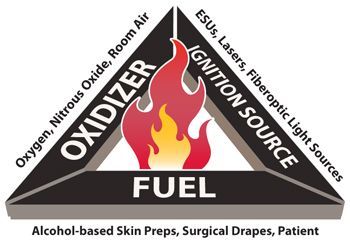Surgical Fire
Medical Malpractice Attorneys in Pennsylvania
Contact Frischman & Rizza Today
Frischman & Rizza, P.C.

Quick Facts
Surgical fires are fires that occur in, on or around a patient undergoing a medical or surgical procedure.
The ECRI Institute estimates that approximately 550 to 600 surgical fires occur each year.
In most cases, surgical fires are preventable. As an integral part of the surgical team, it is important for CRNAs to be aware of potential hazards that may cause surgical fires, prevention techniques, and steps to extinguish a surgical fire.
SURGICAL FIRE MEDICAL MALPRACTICE
Three Elements That Must Be Present to Start an Operating Room Fire
Surgical fires can occur any time all three of the following elements are present:
- Ignition source (e.g., electrosurgical units, lasers, and fiberoptic light sources)
- Fuel source (e.g., surgical drapes, alcohol-based skin preparation agents, the patient)
- Oxidizer (e.g., oxygen, nitrous oxide, room air)
An Operating room fire will occur often when oxygen, which is often administered to patients during surgery, cause a fuel source, such as surgical drape, a patient’s gown or hair, a plastic face mask or an alcohol-based skin preparation agent to combust when heated by an electrocautery unit, a laser, a surgical drill or a fiber optic light, all of which are commonly present in Operating Rooms.
Surgery Fire Injury?
Contact the Surgical Fire Medical Malpractice Attorneys at Frischman & Rizza for a Free Case Evaluation.
Call Us On
Surgical Fire Risks Are Well Known
Although Operating Room fires are not well publicized, the risk of a surgical fire is well known within the medical community. Despite the fact that surgical fires are completely preventable with proper care, recent statistics indicate that more than 600 Operating Room fires occur in the United States every year. Surgical fire medical malpractice often proves devastating as it can cause the patient overwhelming pain, severe and disfiguring burns, permanent scarring and, in certain cases, wrongful death.
Most Common During Head and Neck Surgery
Although a surgical fire can occur during any surgical procedure, they are most prevalent during surgeries of the head and neck. This is due to the fact that each of the three elements necessary for a fire to ignite is in close proximity. Any burn is serious, however, burns to the face and airways are especially devastating.
With the careful control of the three sides of the fire triangle (the oxygen, the fuel, and the ignition source), Operating Room fires can be prevented. In order to safely control the “fire triangle,” the surgical team which includes the surgeon, anesthesiologist and/or anesthesia staff, as well as the Operating Room nurses, must have knowledge as to the potential for a surgical fire and properly communicate to ensure the patient’s safety.
Surgical Fire Medical Malpractice in Pennsylvania
One of the worst things that a surgical patient and their loved ones can be told is that in the Operating Room the patient caught fire during surgery. Surgical fires are caused by medical negligence and are almost always preventable. A burn injury can cause painful, permanent injuries and even death. If you or a loved one has been injured by a fire in the OR, contact our experienced surgical fire attorneys today for a free case evaluation.
Frischman & Rizza, P.C.
In Western PA Since 1992
Injured & Need an Attorney? Call Craig and Bernie!
- The Call Is Free
- The Consultation is Free
- We Don’t Charge A Penny Unless We Win Your Case!


